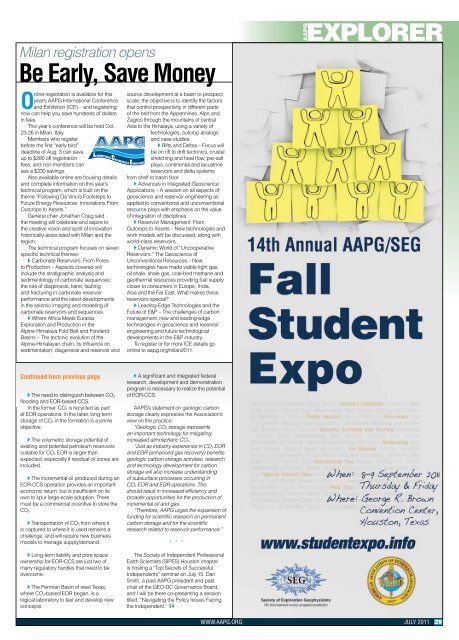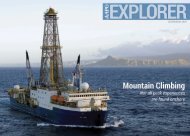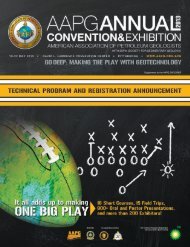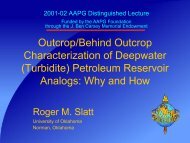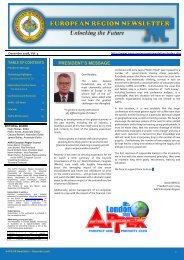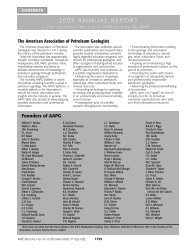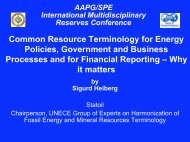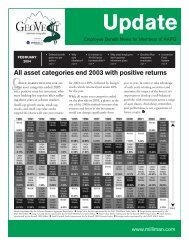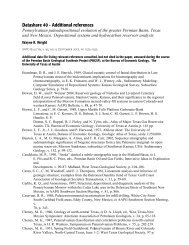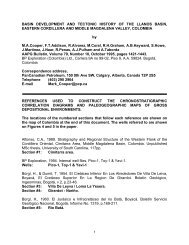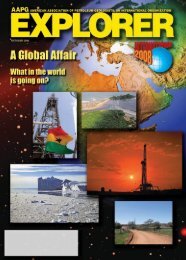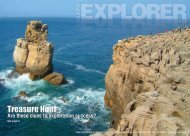AAPG Explorer - American Association of Petroleum Geologists
AAPG Explorer - American Association of Petroleum Geologists
AAPG Explorer - American Association of Petroleum Geologists
You also want an ePaper? Increase the reach of your titles
YUMPU automatically turns print PDFs into web optimized ePapers that Google loves.
Milan registration opens<br />
Be Early, Save Money<br />
Online registration is available for this<br />
year’s <strong>AAPG</strong> International Conference<br />
and Exhibition (ICE) – and registering<br />
now can help you save hundreds <strong>of</strong> dollars<br />
in fees.<br />
This year’s conference will be held Oct.<br />
23-26 in Milan, Italy.<br />
Members who register<br />
before the first “early bird”<br />
deadline <strong>of</strong> Aug. 3 can save<br />
up to $280 <strong>of</strong>f registration<br />
fees, and non-members can<br />
see a $330 savings.<br />
Also available online are housing details<br />
and complete information on this year’s<br />
technical program, which is built on the<br />
theme “Following Da Vinci’s Footsteps to<br />
Future Energy Resources: Innovations From<br />
Outcrops to Assets.”<br />
General chair Jonathan Craig said<br />
the meeting will celebrate and aspire to<br />
the creative vision and spirit <strong>of</strong> innovation<br />
historically associated with Milan and the<br />
region.<br />
The technical program focuses on seven<br />
specific technical themes:<br />
u Carbonate Reservoirs: From Pores<br />
to Production – Aspects covered will<br />
include the stratigraphic analysis and<br />
sedimentology <strong>of</strong> carbonate sequences;<br />
the role <strong>of</strong> diagenesis, karst, faulting<br />
and fracturing in carbonate reservoir<br />
performance and the latest developments<br />
in the seismic imaging and modeling <strong>of</strong><br />
carbonate reservoirs and sequences.<br />
u Where Africa Meets Eurasia:<br />
Exploration and Production in the<br />
Alpine-Himalaya Fold Belt and Foreland<br />
Basins – The tectonic evolution <strong>of</strong> the<br />
Alpine-Himalayan chain, its influence on<br />
sedimentation, diagenesis and reservoir and<br />
Continued from previous page<br />
u The need to distinguish between CO2<br />
flooding and EOR-based CCS.<br />
In the former, CO2 is recycled as part<br />
<strong>of</strong> EOR operations; in the latter, long-term<br />
storage <strong>of</strong> CO2 in the formation is a prime<br />
objective.<br />
INTERNATIONAL CONFERENCE & EXHIBITION<br />
u The volumetric storage potential <strong>of</strong><br />
existing and potential petroleum reservoirs<br />
suitable for CO2 EOR is larger than<br />
expected, especially if residual oil zones are<br />
included.<br />
u The incremental oil produced during an<br />
EOR-CCS operation provides an important<br />
economic return, but is insufficient on its<br />
own to spur large-scale adoption. There<br />
must be a commercial incentive to store the<br />
CO2.<br />
u Transportation <strong>of</strong> CO2 from where it<br />
is captured to where it is used remains a<br />
challenge, and will require new business<br />
models to manage supply/demand.<br />
u Long-term liability and pore space<br />
ownership for EOR-CCS are just two <strong>of</strong><br />
many regulatory hurdles that need to be<br />
overcome.<br />
u The Permian Basin <strong>of</strong> west Texas,<br />
where CO2-based EOR began, is a<br />
logical laboratory to test and develop new<br />
concepts.<br />
source development at a basin to prospect<br />
scale; the objective is to identify the factors<br />
that control prospectivity in different parts<br />
<strong>of</strong> the belt from the Appennines, Alps and<br />
Zagros through the mountains <strong>of</strong> central<br />
Asia to the Himalaya, using a variety <strong>of</strong><br />
technologies, outcrop analogs<br />
and case studies.<br />
u Rifts and Deltas – Focus will<br />
be on rift to drift tectonics, crustal<br />
stretching and heat flow, pre-salt<br />
plays, continental and lacustrine<br />
reservoirs and delta systems<br />
from shelf to basin floor.<br />
u Advances in Integrated Geoscience<br />
Applications – A session on all aspects <strong>of</strong><br />
geoscience and reservoir engineering as<br />
applied to conventional and unconventional<br />
resource plays with emphasis on the value<br />
<strong>of</strong> integration <strong>of</strong> disciplines.<br />
u Reservoir Management: From<br />
Outcrops to Assets – New technologies and<br />
work models will be discussed, along with<br />
world-class reservoirs.<br />
u Dynamic World <strong>of</strong> “Uncooperative<br />
Reservoirs:” The Geoscience <strong>of</strong><br />
Unconventional Resources – New<br />
technologies have made viable tight gas,<br />
oil shale, shale gas, coal-bed methane and<br />
geothermal resources providing fuel supply<br />
closer to consumers in Europe, India,<br />
Asia and the Far East. What makes these<br />
reservoirs special?<br />
u Leading-Edge Technologies and the<br />
Future <strong>of</strong> E&P – The challenges <strong>of</strong> carbon<br />
management, new and leading-edge<br />
technologies in geoscience and reservoir<br />
engineering and future technological<br />
developments in the E&P industry.<br />
To register or for more ICE details go<br />
online to aapg.org/milan2011.<br />
u A significant and integrated federal<br />
research, development and demonstration<br />
program is necessary to realize the potential<br />
<strong>of</strong> EOR-CCS.<br />
<strong>AAPG</strong>’s statement on geologic carbon<br />
storage clearly expresses the <strong>Association</strong>’s<br />
view on the practice:<br />
“Geologic CO2 storage represents<br />
an important technology for mitigating<br />
increased atmospheric CO2.<br />
“Just as industry experience in CO2 EOR<br />
and EGR (enhanced gas recovery) benefits<br />
geologic carbon storage activities, research<br />
and technology development for carbon<br />
storage will also increase understanding<br />
<strong>of</strong> subsurface processes occurring in<br />
CO2 EOR and EGR operations. This<br />
should result in increased efficiency and<br />
broader opportunities for the production <strong>of</strong><br />
incremental oil and gas.<br />
“Therefore, <strong>AAPG</strong> urges the expansion <strong>of</strong><br />
funding for scientific research on permanent<br />
carbon storage and for the scientific<br />
research related to reservoir performance.”<br />
* * *<br />
The Society <strong>of</strong> Independent Pr<strong>of</strong>essional<br />
Earth Scientists (SIPES) Houston chapter<br />
is hosting a “Top Secrets <strong>of</strong> Successful<br />
Independents” seminar on July 15. Dan<br />
Smith, a past <strong>AAPG</strong> president and past<br />
chair <strong>of</strong> the GEO-DC Governance Board,<br />
and I will be there co-presenting a session<br />
titled, “Navigating the Policy Issues Facing<br />
the Independent.” EXPLORER<br />
<strong>AAPG</strong><br />
EXPLORER<br />
WWW.<strong>AAPG</strong>.ORG JULY 2011<br />
29


